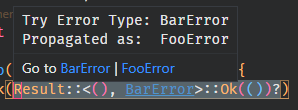11623: fix: Add type variable table to InferenceTableSnapshot r=flodiebold a=tysg
Fixes#11601.
I observed that removing the `rollback` line in 6fc3d3aa4c fixes the issue.
Looking at the stacktrace, I believe not restoring `type_variable_table` causes `type_variable_table` and `var_unification_table` to go out of sync, then when `hir_ty::infer::unify::InferenceTable::new_var` tries to extend `type_variable_table` to be the same length as `var_unification_table`, problems will arise.
However, I cannot pinpoint exactly how or where the vector capacity overflow happens, so my understanding might not be correct after all.
Co-authored-by: Tianyi Song <42670338+tysg@users.noreply.github.com>
- don't return the receiver type from method resolution; instead just
return the autorefs/autoderefs that happened and repeat them. This
ensures all the effects like trait obligations and whatever we learned
about type variables from derefing them are actually applied. Also, it
allows us to get rid of `decanonicalize_ty`, which was just wrong in
principle.
- Autoderef itself now directly works with an inference table. Sadly
this has the effect of making it harder to use as an iterator, often
requiring manual `while let` loops. (rustc works around this by using
inner mutability in the inference context, so that things like unifying
types don't require a unique reference.)
- We now record the adjustments (autoref/deref) for method receivers
and index expressions, which we didn't before.
- Removed the redundant crate parameter from method resolution, since
the trait_env contains the crate as well.
- in the HIR API, the methods now take a scope to determine the trait env.
`Type` carries a trait env, but I think that's probably a bad decision
because it's easy to create it with the wrong env, e.g. by using
`Adt::ty`. This mostly didn't matter so far because
`iterate_method_candidates` took a crate parameter and ignored
`self.krate`, but the trait env would still have been wrong in those
cases, which I think would give some wrong results in some edge cases.
Fixes#10058.
Should fix#10090, #10046, #10179.
This is only a workaround, but the proper fix requires some bigger
refactoring (also related to fixing #10058), and this at least prevents
the crash.
9954: feat: Show try operator propogated types on ranged hover r=matklad a=Veykril
Basically this just shows the type of the inner expression of the `?` expression as well as the type of the expression that the `?` returns from:

Unless both of these types are `core::result::Result` in which case we show the error types only.

If both types are `core::option::Option` with different type params we do not show this special hover either as it would be pointless(instead fallback to default type hover)
Very much open to changes to the hover text here(I suppose we also want to show the actual type of the `?` expression, that is its output type?).
Fixes#9931
Co-authored-by: Lukas Wirth <lukastw97@gmail.com>
9975: minor: Fix panic caused by #9966 r=flodiebold a=flodiebold
Chalk can introduce new type variables when doing lazy normalization, so we have to do the proper 'fudging' after all.
Co-authored-by: Florian Diebold <flodiebold@gmail.com>